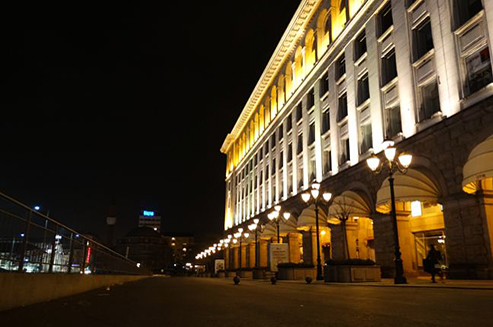The Polish Cultural – Educational Association in the name of Wladysław Warnenczyk is the most active Polish institution in Bulgari and co-operates with the Polish embassy in Sofia. The Association organises various cultural events aiming to promote Polish nature and character. Mostly, it focuses on the oldest emigrants. Young Poles who live in Bulgaria are either offspring of emigrants from the second half of the last century or members of international corporations which operate on the Polish labour market. The other reason for Poles living in Bulgaria is so-called ‘heart emigration’, a phenomenon which was discussed recently at a meeting organised by The Polish Cultural – Educational Association.
The Polish embassy wants to unite the Polish community by creating events such as a Christmas wafer celebration which was held before Christmas last year. Another Polish Institute in Sofia is an agency dependent on the Ministry of Foreign Affairs, and which aims to popularise Polish culture beyond the borders of Poland. This month, the Polish Institute exhibits a series of collage arts devoted to the works of Wisława Szymborska. As we can see, all cultural events are organised by Polish communities for Poles, and are official. However, there are no events that would unite the younger generation, which quickly assimilates with the rest of society. The organisations already described support the expansion of culture, learning of foreign languages and studying at Polish universities. Nevertheless, they do not focus on informal education, as if they did not notice any advantages of funds from the European Union destined for education and the fight against unemployment among the generation of 1980s-1990s.
The activity of Polish business is noticeable mainly in FMCG and in the construction industry. Step by step, the technology industry is also gaining market recognition. The latest big revelation of Polish industry were trams produced by PESA – a Polish factory in Bydgoszcz. Twenty vehicles, which were bought by Sofia, will operate in the city by July. Bulgarians also appreciate Polish food. We can buy packaged meats made by companies such as Sokołów, Mitmar, Salus and Duda. In the centre we can see an advertisement for Soplica vodka and the most popular one available on the market is Żytnia. Polish cosmetics by Ziaja or soaps by Luksja are also popular but favourite Polish products are confectionary – Toruń gingerbread and Wedel chocolate.
Polish construction companies are also actively involved in development of tourism infrastructure, and offer congeneric services. We can find products by Atlas, furniture by Black Red White, and in apartments on the Black Sea coast we can find furnishing by companies such as Bodzio or Indesit
In Sofia there is a wide range of jobs. Due to the low costs of running a business, international companies such as Microsoft, IBM, Lexmark, or BMW open customer service departments which hire native speakers and offer competitive work terms. One of the most popular languages there is Polish. Even though Sofia is the biggest economic centre, the tourist area of the Black Sea is close behind
Bulgaria is the poorest country in the European Union because it is still developing. It is a mix of cultures. Bulgarians think very positively of the Poles, who are seen as well-educated, reliable, very friendly people and good party companions. Bulgaria can be a first step in discovering the markets of Serbia, Macedonia, Montenegro and Croatia. The location of Sofia is very convenient because of access to the sea and shipping lane. It is easy to go to Belgrade, Bucharest, Istanbul and Skopje from Sofia.
Photo © Piotr Ziółek


